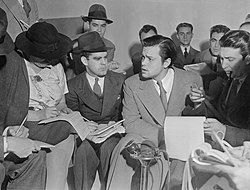| The Mercury Theatre on the Air episode | |
 Orson Welles explaining to reporters that he had not intended to cause panic (October 31, 1938) | |
| Genre | Radio drama, science fiction |
|---|---|
| Running time | 60 minutes |
| Home station | CBS Radio |
| Starring | |
| Announcer | Dan Seymour |
| Written by |
|
| Directed by | Orson Welles |
| Produced by |
|
| Executive producer(s) | Davidson Taylor (for CBS) |
| Narrated by | Orson Welles |
| Recording studio | Columbia Broadcasting Building, 485 Madison Avenue, New York |
| Original release | October 30, 1938, 8–9 pm ET |
| Opening theme | Piano Concerto No. 1 by Pyotr Ilyich Tchaikovsky |
"The War of the Worlds" was a Halloween episode of the radio series The Mercury Theatre on the Air directed and narrated by Orson Welles as an adaptation of H. G. Wells's novel The War of the Worlds (1898) that was performed and broadcast live at 8 pm ET on October 30, 1938, over the CBS Radio Network. The episode is infamous for inciting a panic by convincing some members of the listening audience that a Martian invasion was taking place, though the scale of panic is disputed, as the program had relatively few listeners.[1]
The first half of Welles's broadcast had a "breaking news" style of storytelling which, alongside the Mercury Theatre on the Air's lack of commercial interruptions, meant that the first break in the drama came after all of the alarming "news" reports had taken place. Popular legend holds that some of the radio audience may have been listening to The Chase and Sanborn Hour with Edgar Bergen on NBC and tuned in to "The War of the Worlds" during a musical interlude, thereby missing the clear introduction indicating that the show was a work of science fiction. Modern research suggests that this happened only in rare instances.[2]: 67–69
In the days after the adaptation, widespread outrage was expressed in the media. The program's news-bulletin format was described as deceptive by some newspapers and public figures, leading to an outcry against the broadcasters and calls for regulation by the FCC. Welles apologized at a hastily-called news conference the next morning, and no punitive action was taken. The broadcast and subsequent publicity brought the 23-year-old Welles to the attention of the general public and gave him the reputation of an innovative storyteller and "trickster".[1][3]
- ^ a b Pooley, Jefferson; Socolow, Michael (October 28, 2013). "The Myth of the War of the Worlds Panic". Slate. Retrieved November 1, 2013.
- ^ Schwartz, A. Brad (2015). Broadcast Hysteria: Orson Welles's War of the Worlds and the Art of Fake News. New York: Hill and Wang. ISBN 978-0-8090-3161-0.
- ^ Tonguette, Peter (Fall 2018). "The Fake News of Orson Welles: The War of the Worlds at 80". Humanities: The National Endowment for the Humanities. 39 (4). Retrieved July 5, 2022.